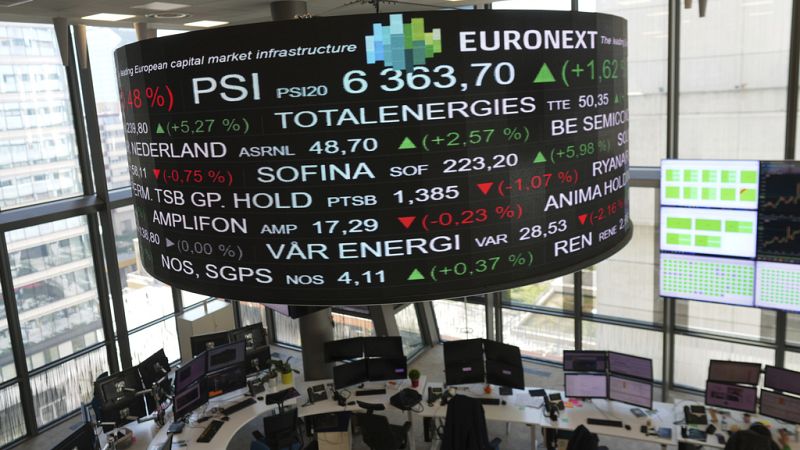
Pan-European stock exchange Euronext has welcomed the idea of more consolidated European capital markets to boost the continent's competitiveness.
Euronext’s CEO, Stéphane Boujnah, reacted to German Chancellor Friedrich Merz' endorsement of a single European Stock Exchange.
“Euronext is ready to contribute to the next level of consolidation of markets in Europe to create a deeper liquidity pool to finance the growth of European companies,” Boujnah told Euronews.
The CEO said he welcomed Chancellor Friedrich Merz' call for “deeper and more attractive European capital markets and for more consolidation in the markets infrastructure sector, ultimately benefitting European companies”.
Euronext represents more than 1,700 companies with a combined market capitalisation of around €6.5 trillion.
Support from Germany and France
Boujnah was reacting to comments made by CDU leader Merz in the Bundestag on Thursday.
“We need a kind of European Stock Exchange so that successful companies like BioNTech from Germany don't have to go public on the New York Stock Exchange," said the chancellor.
The vision of a deeper and more integrated European Capital Markets Union (CMU) — partly designed to provide start-ups with easy access to a large pool of capital — has been a decade in the making. Critics of the current European set-up say that fragmentation hinders scaling, pushing companies to leave Europe for US exchanges.
Progress on the CMU Action Plan has long been hindered by structural and political barriers, although momentum has recently started to build. In part, this is because Frankfurt and Paris have taken significant, coordinated steps to accelerate this long-awaited project.
However, one of the major obstacles to the CMU lies in fragmented regulation and supervision across member states.
“Therefore, we need a decisive move towards single supervision within the European Securities and Markets Authority (ESMA),” Boujnah said.
Merz' speech fuelled hopes that Europe’s largest economy is truly changing its tune, as Germany has so far been hesitant to hand over supervisory licences to ESMA.
By the end of this year, the European Commission is expected to table proposals for a supervisory framework for certain financial institutions. These include central securities depositories, trading venues, and crypto exchanges.
According to ESMA, raising the supervision of a small group of institutions to the EU level could "enhance efficiencies" and "provide a more holistic overview of the risks".
A spokesperson told Euronews Business that the list includes "pan-European market infrastructures" including stock exchanges, as well as new sectors, for example, crypto-asset service providers.
Europe's competitiveness
According to Euronext, greater integration of capital markets could unlock the full potential of the European Union’s €13tn in private savings.
And as well as boosting financing for companies, greater harmonisation has the potential to reduce regulatory fragmentation and cut compliance costs.
Many experts stress that Europe’s strategic competitiveness is on the line, especially as it seeks to keep up with the US and China.
On several occasions, European companies have decided to move overseas to benefit from deep US stock markets. Just this year, Sweden's Klarna, with a market value of €11.5bn, pursued and completed a US IPO. Another Swedish company, Heart Aerospace, also relocated its corporate headquarters and core operations to Los Angeles earlier this year to gain access to US investors.
Companies in Europe are looking for high liquidity and easy-to-access capital to grow. They often get higher valuations overseas and simpler regulatory environments.
How realistic is a single European stock exchange?
Despite the potential benefits, there are many reasons experts are cautious about the logistics of a single stock exchange.
Jérémie Peloso, chief European strategist at BCA Research, said: “I don’t think it would solve the lack of liquidity and depth in European markets, nor the absence of IPOs (at least compared with Asia and the US).”
“Assuming the European stock exchange is brought to life, we would see listed companies in national markets (DAX, CAC, IBEX, etc) having to decide whether to list at the national or at the European level. As for foreign public companies, I also see limited attractiveness,” he added.
Meanwhile, significant obstacles remain for a single European stock exchange, such as national competition, current differences in regulation, and the need to hand supervisory power to one entity.
Member states are reluctant to give up control over their own markets, including supervision of exchanges. Some member states, including Luxembourg and Cyprus, hastily voiced their concerns about increased costs and regulatory burden from a new centralised EU authority.
Overcoming obstacles now depends on leaders such as Friedrich Merz. But merging disparate markets in the European Union, each holding their own traditions, languages, and risk tolerances, remains a monumental task.







